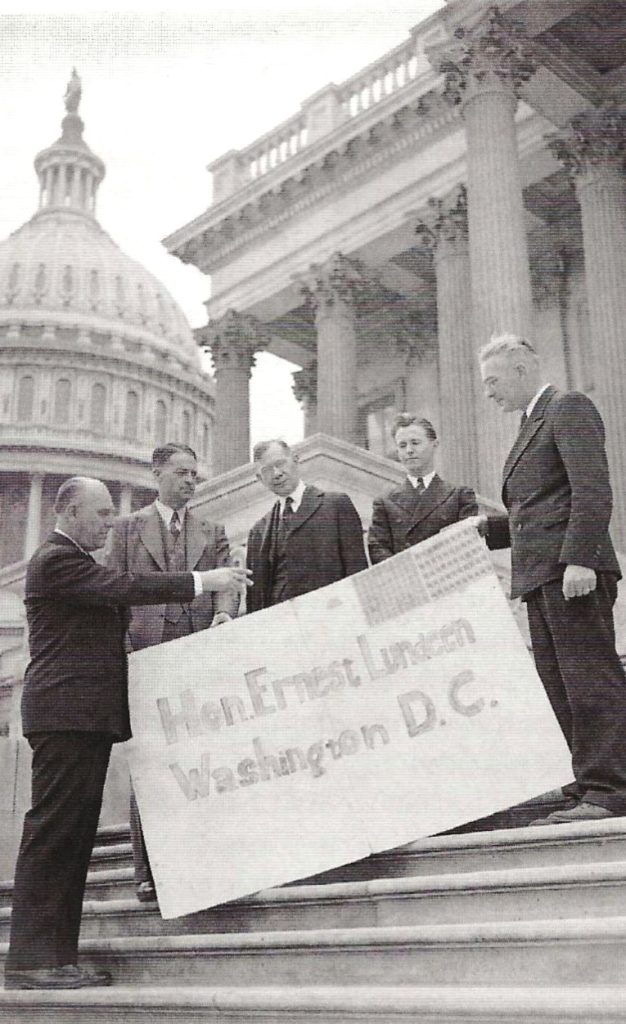Editor’s Staff
A U.S. Senator killed
in a 1940 plane crash
and America’s Largest Postcard
Artificial Intelligence
In a lengthy and serious conversation with a friend who teaches in a local university, I was told how students are submitting term assignments or theme papers that they solicited from a website that will prepare a word document of any length, in any style, on any topic using artificial intelligence.
The resulting document comes out of the printer in letter-perfect English, all properly punctuated, and without spelling errors. Any experienced teacher should spot these fake submissions in a heartbeat and call their student to the proverbial carpet to defend their “work.” Unfortunately, there are students who think they can lie-their-way out of guilt by feigning insult and defend their actions with, “everyone is doing it.”
I know this sounds smug on every level, but it is also true!
A recent experiment using the topics from the title above, one of the most popular AI websites produced a 750+/- word document of trite generalizations in a style I would liken to an eighth-grade essay that contained only two salient facts, about which I can say, “There’s nothing to worry about – Yet!”
***
Real, Easy to Do in a Few Minutes, Research
My favorite history books are anthologies of mostly forgotten events in history. The origins of most tales like these are newspaper fillers from five, six, seven, or more decades ago. Most are no more than three to five paragraphs, and they have come to print under the watchful eye of very competent editors and capable proofreaders. For the well-informed student of history such books are fun for two reasons, first for the articles you find, and second for the facts you do not. The only real concern in reading these texts is that all too often the wordsmiths who create them know little or nothing about their subject, which inspires the really curious reader to do just a few minutes more research that will reveal – as Paul Harvey always said, “the rest of the story.”
One such book, found in a publisher’s warehouse sale, contains within its 385 pages a story about the largest postcard ever mailed. Parts of the story are quoted below:
The year 1905 was a great one for getting into the
postcard business. The penny greeting had by then
become a mania that was racing across the continent like
some exotic strain of flu.
… the postcard germ, as social commentators dubbed
the fad, first appeared in America at the World’s
Columbian Exposition in 1893.
By the end of the century, the microbe had become
a ubiquitous infection – “postcarditis.”

A sidebar was included to embellish how Americans were infected by “postcarditis.” It featured a real-photo postcard of five gentlemen and a postcard.
The card in the photo is supposedly the largest postcard ever mailed. It is unsure as to whether this event was within the era when anyone could put a stamp on anything and the post office would deliver it, but either way, the sender paid $1.50 in postage.
The card was sent to Senator Ernest Lundeen (at the left edge of the photo, pointing) of Minnesota urging him to support a bill providing leave time for Post Office employees.
***
Ernest Lundeen was born in the Dakota Territory in 1878. He was one of only a few in his family to survive a diphtheria epidemic in the 1880s. He relocated to Minnesota sometime after 1894 and from there started a long period of service to America. He fought in the Spanish-American war and was first elected to public office in 1911. He was elected to the U.S. Senate in 1936.
Upon his arrival in Washington, he made himself known as a communist sympathizer and an anti-war activist with some outlandish ways to reach his goals. His fondest dream was to seize all British Territory in the Caribbean (including Bermuda) as repayment for Britain’s World War I debt to the United States.
Yes, this is an interesting bit of history, for in the end – that is, Lundeen’s end, – he was killed in a plane crash on his way to Detroit on August 31, 1940. He was planning to participate in a meeting with a top Nazi spy who had been working in the United States to circulate pro-Hitler and anti-Semite propaganda.
***
This is real history! When we look at the “big picture” it is doubtful that artificial intelligence can make it better. What was it that Lord Byron wrote in his novel Don Juan, “Truth is stranger than fiction.”
This old lady remembers that it was Paul Harvey who always said, “the rest of the story.”
I’m now thinking about whether Bermuda, the Bahamas, Jamaica, and other outposts of the old British Empire would have become states had washington seized them, or if they would now be administered more like Puerto Rico or the U.S. Virgin Islands are.